Leap Day's Lesson of HumblenessThroughout the year, the Southern New England Conference of the United Church of Christ produces the Daily Lectionary for use by churches. These are the suggested readings for Saturday, February 29th: Psalm 51; Isaiah 58:1-12; and Matthew 18:1-7. I would encourage you to read these short selections as part of your Lenten practice.
Today’s a bonus day. A day observed every four years to keep our calendars in line. Without it, every four years the calendar would creep an unaccounted day forward. Let that pass 31 times and January begins in February. Let it continue and we have December in the middle of summer. The calendar is a human invention. It doesn’t control time; it only measures it. There’s an important lesson of humility in this. One of today’s readings is Psalm 51. Authorship is credited to King David after he had raped Bathsheba. We don’t need to mince words about this story. The king’s palace is situated on the highest peak in Jerusalem. David looks down on the city below him. A woman is bathing in her own home. According to custom, this takes place on the privacy of her roof. David sees her and is aroused. He has wives and even concubines aplenty. Instead, he sends soldiers to bring her to his palace. Bathsheba’s husband, Uriah, is off fighting one of the king’s wars. David rapes Bathsheba and sends her home. The story only degenerates further as it goes along and rape leads to murder. God takes notice and rebukes the king through the intervention of the prophet Nathan. The king may have thought himself above the laws of morality and decency, but God humbled mighty David. Psalm 51 is credited as David’s words of contrition and repentance. Here is another lesson of humility. Power and stature may convince people that they are beyond accountability, but we need to remain humble and to realize that before God no one can brag, no one can claim priority over anyone else. A sure, historical phrase of Jesus was “The first shall be last and the last shall be first.” This sentiment is repeated in the Matthean passage shared today when Jesus says, “‘Truly I tell you, unless you change and become like children, you will never enter the kingdom of heaven. Whoever becomes humble like this child is the greatest in the kingdom of heaven.’” As Christians we find honour in humility, acknowledgement in service. Lent began with the humble act of public penitence with ashes placed upon our foreheads. We all fall far short of the ineffable sacrifice of Christ crucified. In the cross’ shadow no one can boast. The humbleness of this season counters the egoism of the world. It helps us to look beyond ourselves and to see the equal worth of others. I invite you to come worship as part of our community tomorrow, to become a part of the body of Christ where we must all function together in humbleness for the good of the whole.
0 Comments
The warning of the whiny prophetThroughout the year, the Southern New England Conference of the United Church of Christ produces the Daily Lectionary for use by churches. These are the suggested readings for Friday, February 28th: Psalm 51; Jonah 4:1-11; and Romans 1:8-17. I would encourage you to read these short selections as part of your Lenten practice.
Today is the first Friday of Lent. Fridays seem to take on a special importance during Lent as they remind us a bit more strongly of Good Friday. I’ve been asked to prepare a short meditation on the virtue of Christian love for a group I belong to in the area. My plans are to base the meditation on the Book of Jonah. I’m choosing Jonah because I have no idea of how familiar the members are with the stories of the Bible. There is a good chance, however, that many if not all of them will be familiar with the story of Jonah. Jonah is not an historical account. It is a prophetic parable, if you will. Usually in a prophetic book the prophet’s words are front and center. In this book, Jonah prophesies one unremarkable sentence. In this book, all of the other characters beside the prophet are decent. Jonah, on the other hand, is whiny and self-absorbed. Jonah is presented as the anti-hero. In today’s selection from Jonah, God has already “changed his mind” about destroying Nineveh. God’s forgiveness is resented by the prophet: “‘… I knew that you are a gracious God and merciful, slow to anger, and abounding in steadfast love, and ready to relent from punishing.’” When a merciful God looks toward us, we appreciate it, but the point of the book of Jonah is why shouldn’t we do the same when God looks at others, whoever they are? This is the reason why God asks, “‘Is it right for you to be angry?’” Jonah’s is a negative righteousness. He uses his “righteousness” to separate himself from others. The Ninevites were enemies of Israel. They had defeated and deported much of the prophet’s nation. Jonah wished to see the favour returned. Jonah was looking for vengeance from God, not forgiveness. Then there is the story of the shady bush that grows quickly and dies just as quickly, and again the whiny prophet prays for death because of the lost shade. He’s sitting on a hillside waiting for 12 x 10,000 people to be sacrificed. 12 is a symbolic number of fullness and 10,000 symbolizes a vast, uncountable aggregate. Jonah whines because he is hot, but Jonah cannot sympathize with the suffering and death of an entire population. Jonah does not see them as human, and God must remind His prophet that He loves all of creation, even the “many animals.” This is a foreshadowing of the love of Christ as He accepts the brutality of the cross. Jesus dies not only for saints, but for sinners, not only for believers, but even for the ones who put nails through His holy flesh and wait for Him to die. Lent asks us to ponder this revelation of unconditional love. And the Book of Jonah confronts us with the prophet’s negative righteousness as a warning to consider. The love of a crucified Saviour is hard to process. This is why we need to help each other in our faith. Paul shares with us today this same message: “… so that we may be mutually encouraged by each other’s faith, both yours and mine.” On this first Lenten Friday, may we give some of our time to meditating upon the cross, what Jesus reveals on it, and our response to it. And may we be there for each other to help build-up the community of faith so that the community may help build-up the faith of each of us. Let Lent change usThroughout the year, the Southern New England Conference of the United Church of Christ produces the Daily Lectionary for use by churches. These are the suggested readings for Thursday, February 27th, Psalm 51; Jonah 3:1-10; and Romans 1:1-7. I would encourage you to read these short selections as part of your Lenten practice.
Change is a Lenten goal. The hope is that we are a changed person/people at the end of Lent. Too often, though, change is a negative sounding word within religious groups. It seems to imply that we have not been faithful to the traditions we have received. The past is glorified as being the halcyon days of the faith. The Jews of the Exodus period, for example, wanted to return to Egypt. Once settled in the Promised Land, the Exodus then became the paradigm of the people’s closeness to God. Ten of the twelve tribes broke away from the Davidic monarchy because they felt disenfranchised, but then that same monarchy became Israel’s golden era during the time in Exile. There’s a constant looking back that idealizes history at the expense of the present. But Jesus didn’t worship the past. His was an immediate connection with God as “Abba” (Father). He did maintain the religious traditions of His Jewish faith, but he also reinterpreted them. There is that amazing sequence in the Sermon on the Mount that builds in intensity as Jesus says repeatedly, “But I say to you …” Jesus was not afraid to usher in change when and where needed. We may say that’s because He is Jesus. He has that right as the Son of God. But Paul changed the Christian proclamation, and Paul never even met the historical Jesus. Paul was not one of the Twelve and yet his Christian proclamation superseded that of those first disciples. And we, in turn, reinterpret Paul. Paul writes in today’s passage from Romans that Jesus “was declared to be Son of God with power according to the spirit of holiness by resurrection from the dead.” Was Jesus not the Son of God prior to the resurrection? Any of us who celebrate Christmas would say that He is. Change is as natural in the faith as it is in anything else living. Even God changes. In the story of Jonah, the prophet preaches God’s judgment in Nineveh and surprisingly they repent, from the animals in the field to the king on the throne. God is impressed, and it is written in Sacred Scripture that “God changed his mind.” I have to believe that God also changed when Jesus was born, lived, died and resurrected. I can’t see how this could not change the nature of God since Jesus brings all of these new and unique experiences into the Godhead. If change is natural and spiritual change is necessary, then let Lent change us. Everyone of us can grow in Christ. Don’t fret the loss of the past. Embrace the possible of the present. Take Lent seriously enough that it challenges. What else would we expect as we prepare to approach a crucified Saviour? "Return to me with all your heart …”Throughout the year, the Southern New England Conference of the United Church of Christ produces the Daily Lectionary for use by churches. These are the suggested readings for Ash Wednesday, February 26th, Psalm 51:1-17; Isaiah 58:1-12; Joel 2:1-2, 12-17; Matthew 6:1-6, 16-21; and 2 Corinthians 5:20b—6:10. I would encourage you to read these short selections as part of your Lenten practice.
The Prophet Joel still shares God’s revelation with us today. The church turns to his ancient words and calls us to a solemn assembly. Today begins the 40 days of Lent, a sacred time of introspection as we stand beneath Jesus’ cross. This does not have to be a time to only confess sin, but rather to seek sincerity: “Yet even now, says the Lord, return to me with all your heart …” Lent is a time to move beyond religious platitudes and to be vulnerable enough to judge what Christ really means to us in our lives as we look up at Him on the cross. Lent is a time to take our faith so seriously, to believe so deeply, that we must live it convincingly. God is not fooled by religious imitations, displays and tantrums. God’s perfect revelation is Jesus, and Jesus’ perfect revelation is all that the cross exposes. Isn’t this what God reveals to us through the prophet Isaiah: “…day after day they seek me and delight to know my ways, as if they were a nation that practiced righteousness and did not forsake the ordinance of their God; they ask of me righteous judgments, they delight to draw near to God. Is not this the fast that I choose: to loose the bonds of injustice, to undo the thongs of the yoke, to let the oppressed go free, and to break every yoke? Is it not to share your bread with the hungry, and bring the homeless poor into your house; when you see the naked, to cover them, and not to hide yourself from your own kin? ... Then you shall call, and the Lord will answer; you shall cry for help, and he will say, Here I am.” It is not enough to pray pretty prayers. Lent draws us out to the dirty work of making the world more just and equitable. When we worship a crucified seditionist who the powers of the world could not tolerate, why would we be surprised to be called upon to change the world and to challenge power in His name? We are “ambassadors for Christ,” says Paul. “God is making his appeal through us.” Christ could give no more than Himself on the cross. As we look to the cross throughout Lent, hopefully we are inspired to ask what we may give in return. The whole of the journey is before us. On this first day of Lent, may we pray that the journey bring us ever closer to Christ and ever deeper in our own faith. For larger print text or to download, click the PDF file below.
Waiting for the light to changeThis Wednesday, February 26th, is Ash Wednesday and the beginning of the Season of Lent. Lent's 40 days draw us back to Jesus' 40 days in the desert after His baptism by John.
During this period of solitude, Jesus confronted His temptations and emerged stronger in His conviction to be and to do what God intended. Lent is our opportunity of introspection and examination. It is our chance to re-focus our lives and to give them a more profound spiritual grounding and direction. The whole of the season is in front of us. This is our opportunity to make the most of it. I invite you to journey with us at Hatfield Congregational Church. Please feel free to join us at worship, at Bible study or at our Lenten Discussions, the schedule of which is below. A crucified Saviour is a daunting task to contemplate, but one well worth these coming 40 days. Rev. Randy "Choose Life"“May the words of my mouth and the meditation of our hearts be acceptable to you, O Lord, my rock and my redeemer.” (Ps 19:14) We are surrounded by choices. Every day is filled with them. Some are more important than others. This past Tuesday voters agonized over who to vote for in the New Hampshire primary. It was reported that they were so conflicted that many couldn’t make up their minds until they finally walked into the voting booth. Other choices are not as consequential. One would be where we do our grocery shopping. Last Sunday after church, Sharon and I went into Northampton to return a few unused items that had been purchased for the Youth Group Spaghetti Supper. I go up to the Courtesy Counter at Big Y to return a couple of jars of Parmesan Cheese. This is when the lady behind the Courtesy Counter was very courteous to me. She had a bit of a smirk on her face, but other than the quite understandable smirk, she was very understanding when she informed me that the Parmesan Cheese that I was trying to return to Big Y, was actually the generic Stop and Shop brand that I had purchased at, logically, Stop and Shop. I was embarrassed and apologized, but she took it in stride. I don’t think the choice of grocery stores was a life-defining choice even for the Big Y employee. Another choice that lies in-between the level of importance of these two examples is the choice to save … that is to save your work on the computer. I’m home typing today’s sermon. Not very far along. My needy dog gets off the couch and comes over for some attention. I pet him for a bit and then I turn back to the computer. Mason, my dog, was not satisfied. He tried to stand-up and lean on my lap, but my lap was covered by the computer’s keyboard. I don’t know what the beast hit on the keyboard, but he hit something that closed down Microsoft Word. When I brought it back up again, maybe the last two or three sentences I had typed were gone. So, talking about the choice to save, let’s move on to this morning’s readings, which are about a more significant kind of saving. The selection that Wunderly read for us from the Book of Deuteronomy is a closing statement at the end of the books of Law. There are five books of Torah, Jewish Law, that stand at the beginning of the Bible. There are the first four, and then the fifth is a retelling of the Law. That’s where the word Deuteronomy comes from. It’s the second telling of Torah. And today’s selection is at the end of the Law and the re-telling of the Law. This is the context for Moses’ statement when he testifies to the whole people of God: “I call heaven and earth to witness against you today, that I have set before you life and death, blessings and curses. Choose life …” This is a stark declaration. God has endowed us with the ability to think for ourselves and to choose for ourselves. We have the capability to over-ride our instincts and to choose how we will live. I accept the science of evolution. I accept survival of the fittest as the best explanation for the diversity of creation that we witness. I believe this process continues even today. But I also believe that we have the God-given blessing of choice, that we can think beyond our survival instinct and that we can imagine a better alternative, that we can choose morality, that, in Moses’ words, we can “choose life.” Morality is the counter-intuitive notion that we should act for the good and benefit of the many, possibly even the all, rather than just for myself. To choose morality over instinct raises us up and helps us walk that path that leads to higher truths, but it also leads to blessings here and now. Morality lets us choose life. When I first moved back to Western Massachusetts in 1988, I left the city of Scranton, Pennsylvania. I remember talking to a woman from Montague at the time. I don’t remember the context of our conversation, but she told me that she never locked her house. The door was always left unlocked. If she went out, when she went to bed for the night, the door was never locked. You wouldn’t do this in Scranton, and I remember being surprised by her never locking the house. But in Montague, she felt safe enough to not have to worry about someone entering her home to do anything bad. When enough people in society choose morality, it changes life. When enough people would never dare imagine walking into someone else’s home without permission, our lifestyle is so much healthier than when we must enforce morality with more police or more guns or whatever. When we choose morality, we choose life – not only eternal life, but the life we lead right now. Morality is a blessing. It transforms life. It repairs our broken world. It makes us kinder. Morality can’t be enforced anywhere near as well as it can be embraced. This is part of what Jesus is getting at in this morning’s passage from the Gospel as we continue to read the Sermon on the Mount. The Torah, the Law, is explicit in its treatment of acts of violence such as murder or rape. And I use the word rape intentionally because often times in the ancient world, and sadly too often today, adultery was often just rape with the blame thrown on the woman as well. But Jesus pushes morality beyond just what we do. He digs deeper. Jesus goes to the root of what may eventually lead to violent actions. This is why Jesus talks about the sin of anger and the sin of lust, even when they only lurk in our thoughts and have not yet broken out as actions. Jesus is trying to convert us from the inside out. He’s trying to help us choose morality, to choose life, not as something imposed, but as a choice embraced. We have choices to make every day. Some important. Others not so much. But church is a choice that helps us choose life. Church can help save us from ourselves. Church preaches morality, and morality moves us beyond instinct, and morality lets us work for a greater and shared good.
It is such a blessing to choose life. It frees us from the meanness and selfishness of the world. It gives us hope that we can repair the world and make it kinder. So like Moses said thousands of years ago, “I call heaven and earth to witness against you today, that I have set before you life and death, blessings and curses. Choose life …” May we seek more than survival. May we choose life. And may our shared faith as this church community help us nurture the awesome privilege of our freedom to choose, and our freedom to choose kindness. For this we pray in Jesus’ name. Amen. “May the words of my mouth and the meditation of our hearts be acceptable to you, O Lord, my rock and my redeemer.” (Ps 19:14) As I have said before, I’m not a football fan. I don’t usually watch the Super Bowl, and that’s even when the Patriots were in it year after year. But last Sunday evening, Super Bowl Sunday, I went down to my Masonic Lodge in Amherst because we just purchased an 85” television. Some of the guys got together to watch the game and I figured I’d go over for a while. Well, I talked more than watched, but I also ate. They had every kind of junk food imaginable: pizza, hot dogs wrapped in some sort of pastry puff, chips and sandwiches. One conscientious soul brought a vegetable platter. It sat in the middle of our circle and I mean it just sat there. I think most of the vegetables went home at the end of the night. Most everything we did eat was not on any hospital menu. As a matter of fact, it’s probably the stuff that sends you to the hospital. I do remember an unopened bag of Doritos that I asked a friend to bring over to the couch we were sitting on. I don’t know how many Doritos he ate, but by the time we left, the bag was empty. I don’t eat like that too often. Sharon and I are pretty good. But I think I ate most of a whole bag of Doritos. When I got home and then throughout the night, I was parched. I kept drinking water. Even after I went to bed, I had to drink more water. My body was not prepared for all the salt I had eaten at the Lodge. The salt wasn’t saltier. I just consumed a whole lot more of it than usual. I share this story with you because of Jesus’ warning in today’s Gospel that unsalty salt is useless and thrown away. But salt doesn’t lose its saltiness. Salt is a chemically stable compound. This is true now and it was just as true 2,000 years ago. The chemistry hasn’t changed. Salt can, however, become diluted and lose its saltiness that way. Jesus’ warning to us is about diluting our faith and the way we live our faith. We are the “salt of the earth,” He says. Salt was used in Jesus’ day primarily as a preservative. It kept people healthy because it kept food healthy. What Jesus is asking us to do when He says we are the salt of the earth is to help keep the world healthy. What does that mean, that grand statement that we are called upon to keep the world healthy? Today’s Gospel passage continues with Jesus’ Sermon on the Mount. He has just finished offering the Beatitudes. That was the passage we read last Sunday. It began with blessed are the poor in spirit, which means blessed are those dependent upon God. It means we realize we can’t do it all on our own. It’s a blessing to realize we need God in our lives. Blessed are those who mourn is a statement about empathy, which is the truth that we also need each other. This leads logically to the Beatitude that blessed are the meek. This is a pronouncement against self-pride, the belief that we don’t need anything from anyone, and even if that’s true or believed to be true, it can then give rise to the callousness that no one should expect anything from us. (Rugged individuals) The opposite of this sort of selfishness is blessed instead are those who are not only righteous, but who hunger and thirst for righteousness, who need it as much as they need food and drink. Blessed are the merciful, says Jesus, because then others will hopefully do the same, and the world changes person by person. Blessed are the pure in heart, or put another way, blessed are the single-minded whose center is God, who don’t push faith to the sidelines, who don’t sacrifice what is right when a difficult choice needs to be made, who are willing to face the consequences rather than ignore their conscience. Blessed are the peace-makers in a world filled with war mongering. These brave and often ridiculed souls are called the “children of God” by Jesus. Remember last week’s story about Jonah? He was the prophet who relished judgment and destruction and thought these were the marks of God. And remember also that instead God was compassionate and forgiving. This is why the peace-makers are named the children of God. And then the Beatitudes come to their end and Jesus warns, “‘Blessed are you” for you will be persecuted if you live like this. In a world filled with insult, intimidation and violence, we will be blessed by God if we choose to live differently, to live deliberately as Christians, to live like Jesus’ Beatitudes expect. This is what it means to be “the salt of the earth” and to help preserve the earth. (Not like JBap. Not retreat from society, but make a difference in society.) Think back to the reading Maureen shared with us. Paul enters the city of Corinth, a prosperous, commercial hub of all kinds of activity. It’s a city that lived by trade. There was a lot of money to be made in ancient Corinth, if you played by the rules, and if you were more than a bit ruthless.
Paul enters the city and preaches Jesus, and Paul doesn’t dilute Jesus or His gospel. He comes right out and reminds them in today’s Epistle that he didn’t preach with words that would be hailed as wise and learned. Instead, says Paul, “I decided to know nothing among you except Jesus Christ, and him crucified.” And the faith took root and it grew and it literally changed the world. That’s what being the “salt of the earth” is all about. It’s about keeping the world healthy in a sense, and to do that we can’t allow our faith and our faith-lives to become diluted with so many other things that they lose their saltiness, that being a Christian isn’t all that different from the world. When it comes to my diet, too much salt is not a good thing, but when it comes to Jesus’ imagery that we are “the salt of the earth,” it is a very good thing. Let us choose in turbulent times to be steady in our witness to Jesus. Let us challenge ourselves to live the Beatitudes and know them as blessings not sacrifices. Let us encourage each other because what we are called to do and to be is hard, but let us also be optimistic because we don’t ever act alone. Jesus is always with us. May we truly be the “salt of the earth,” and may we be as salty as the snacks at a Super Bowl party. For this we pray in Jesus’ name. Amen. Thank you to the Youth Group members and their families for this evening's Spaghetti Supper. They volunteered their time and even some of the ingredients.
Thank you also to Stop and Shop Supermarket in Northampton, Big Y Supermarket in Northampton, Hatfield Beef and the Texas Roadhouse Restaurant in Hadley for their very generous donations. Thank you to Sue M. for her famous hot fudge sauce, and to Carol and Joann for taking care of dessert prep., and to all those who baked brownies for us. The profits from this evening's supper will allow our young people to plan more activities, so thank you also to the 80 of you who supported our efforts this evening. Much appreciated. Rev. Randy |
NewsFaith, love and chitchat. Categories
All
Archives
June 2024
Follow
|
||||||
|
SERVICE TIMES
Sunday 9:30-10:30am Children Sunday School 9:30-10:30am Nursery care available during worship DONATE Make a single or recurring contribution by clicking here |
FOLLOW
|

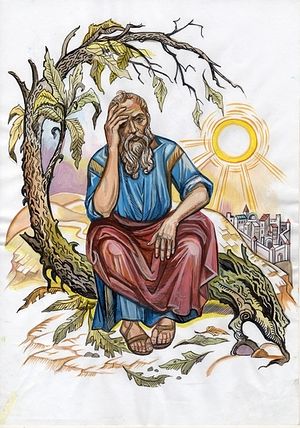


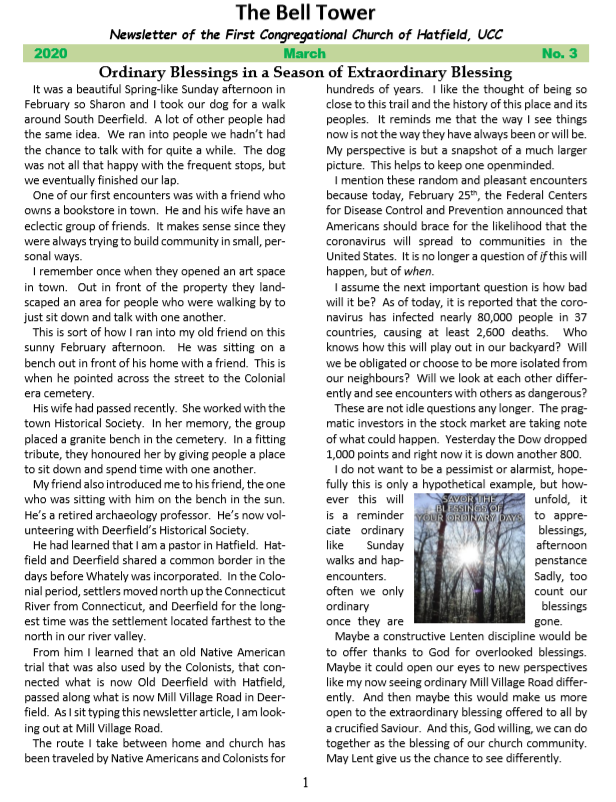
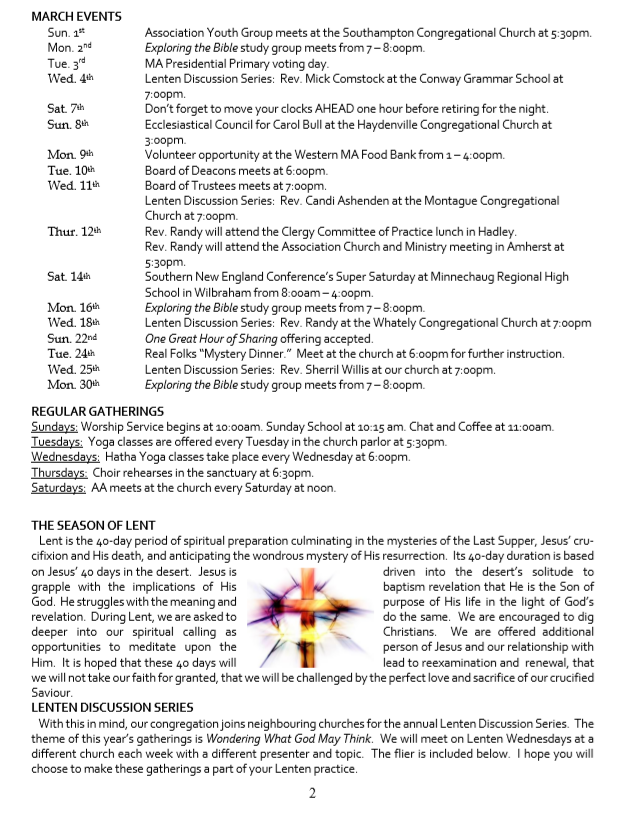
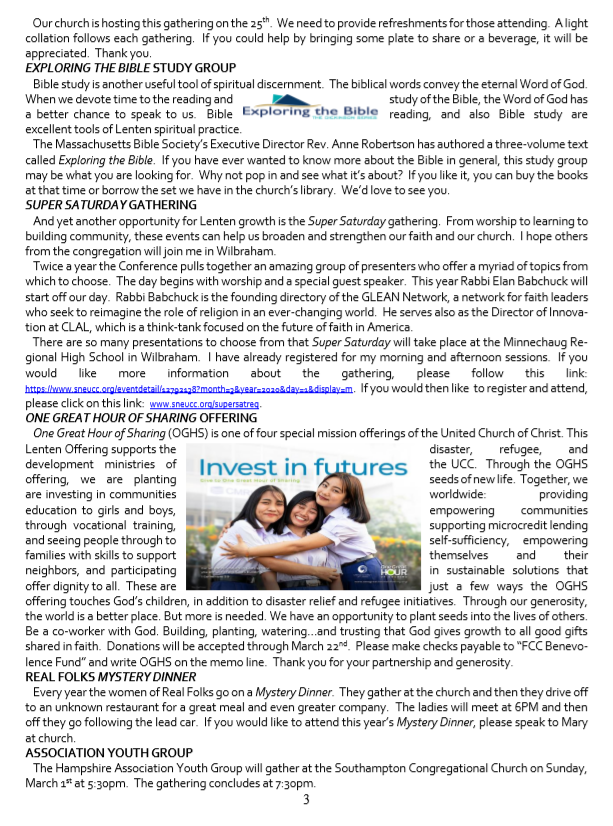
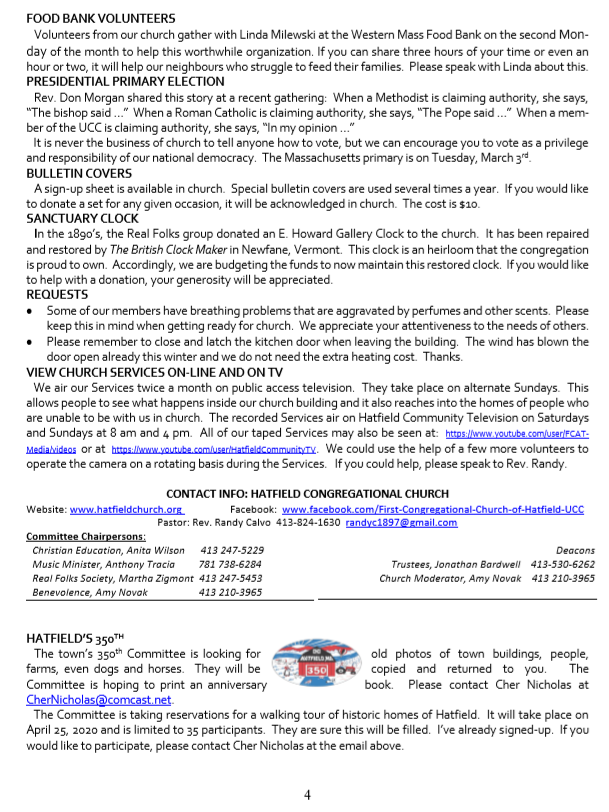
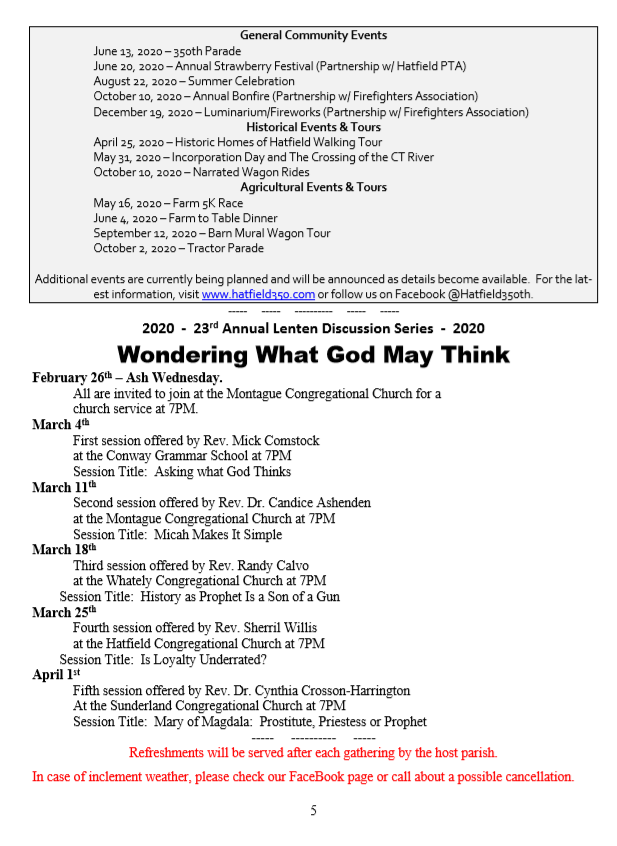

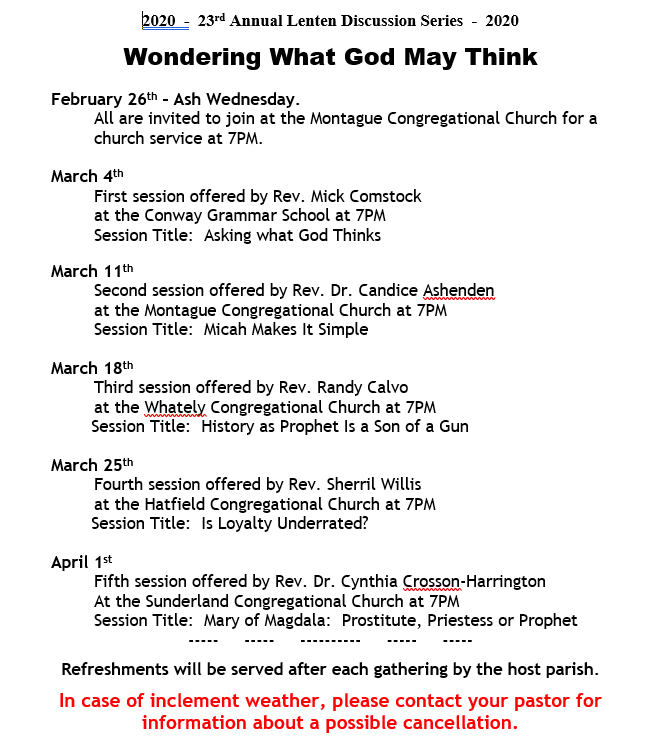
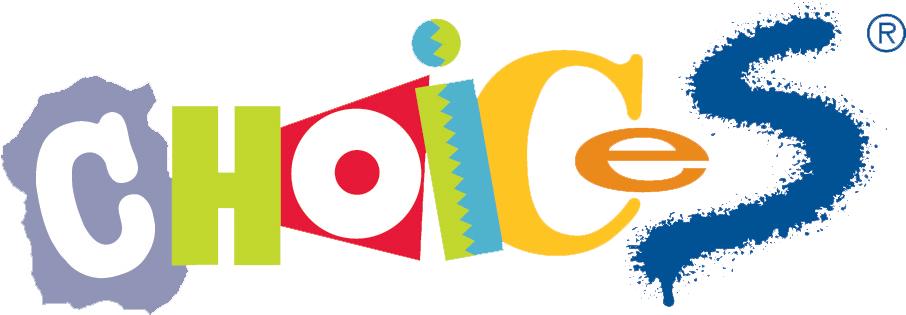


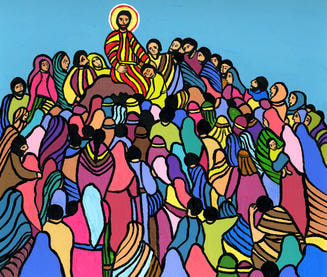

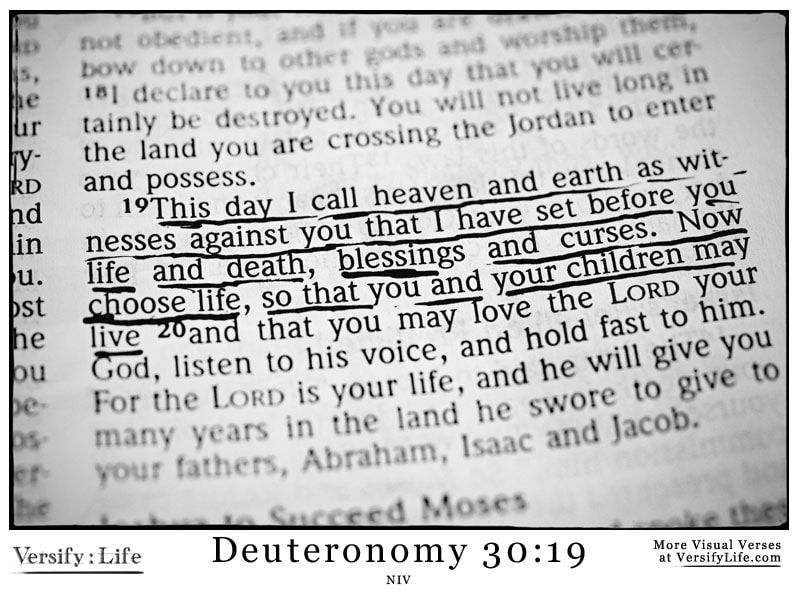

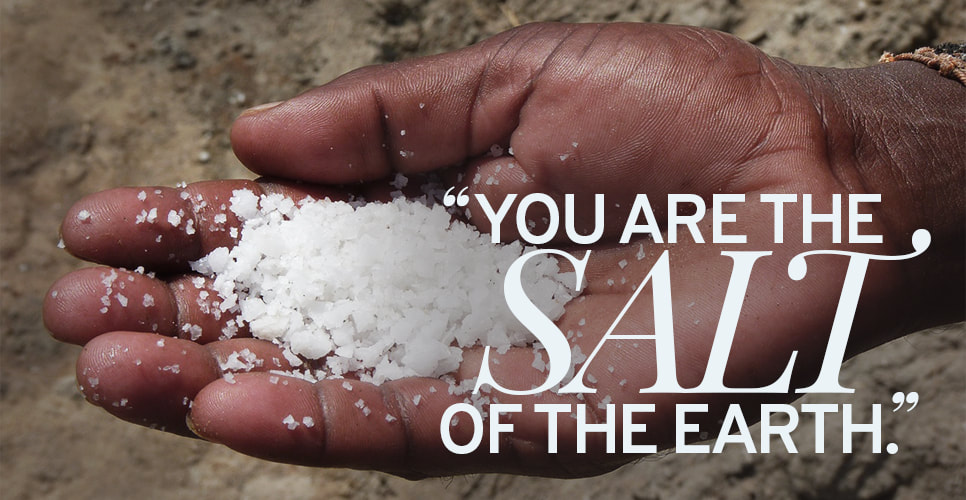


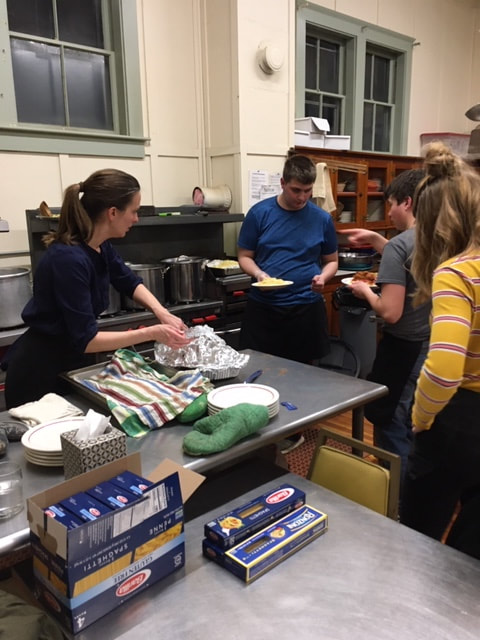

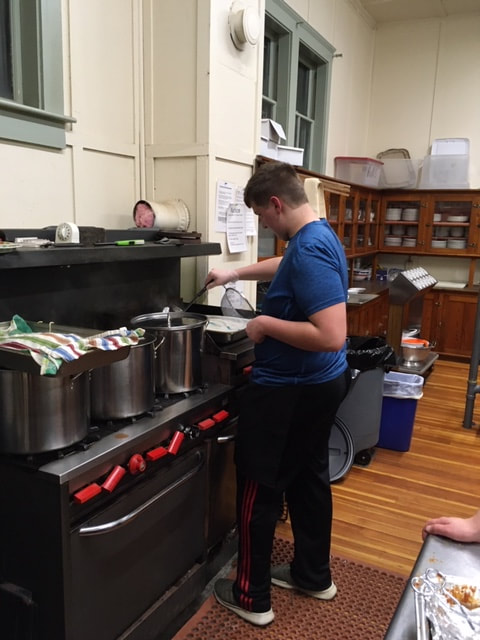
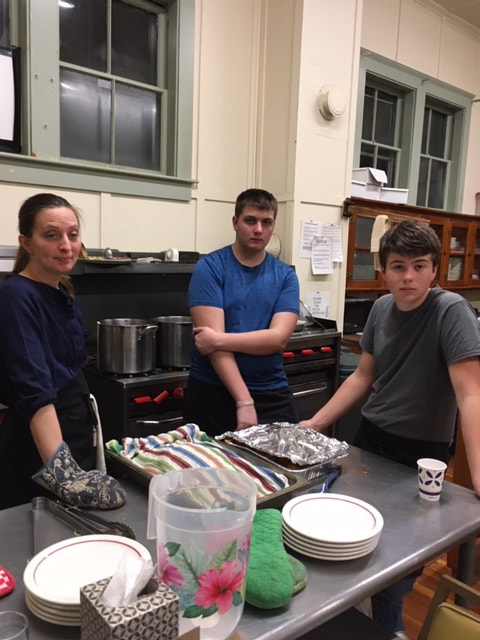
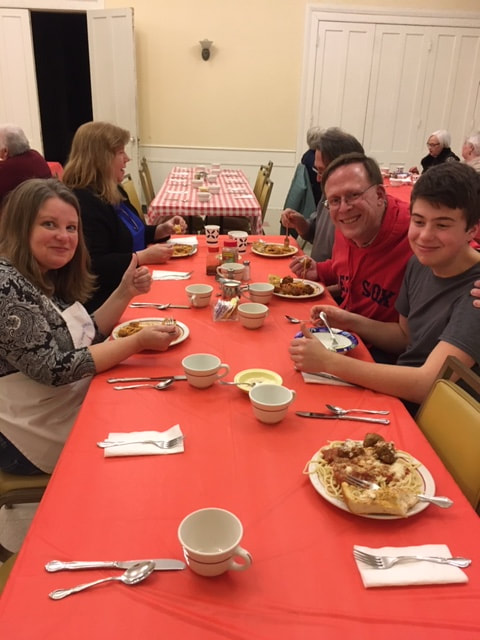
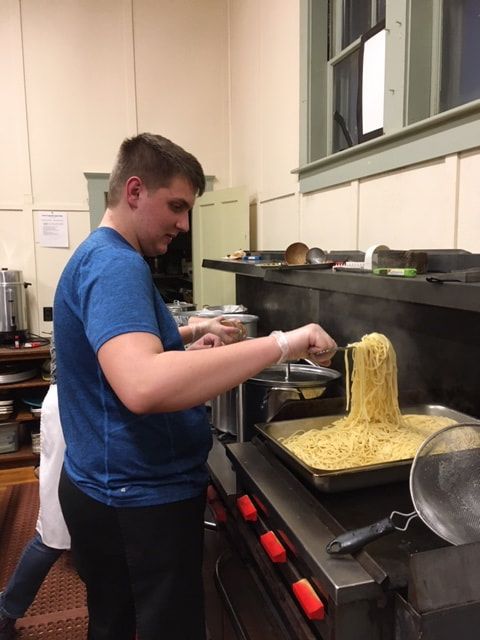

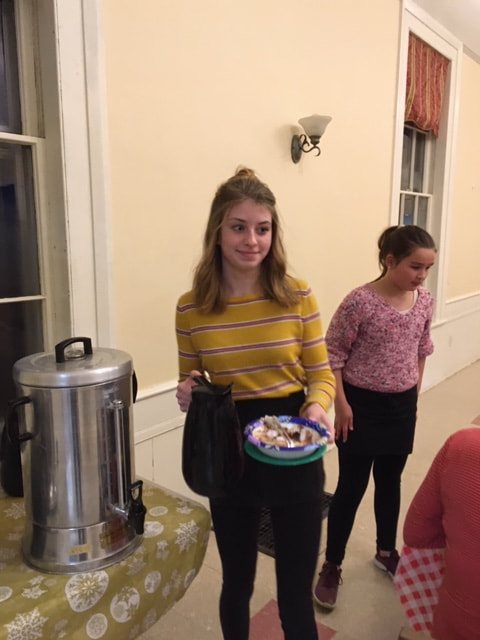
 RSS Feed
RSS Feed
